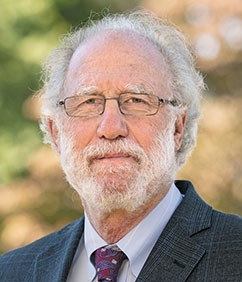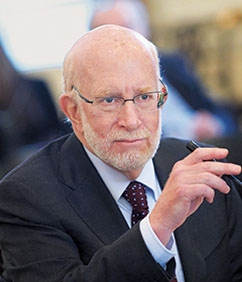Experts forecast the legal landscape as votes are counted
The uncertainty and tension of the 2024 presidential campaign will not end with Election Day, and voters should not expect to know the result that night or the day after, election law experts warned during an October 21 discussion, “The Legal Battle over the Vote: Election Law in 2024.” The panelists—Bob Bauer, professor of practice and legal advisor to the Barack Obama, Joe Biden, and Kamala Harris campaigns; Ben Ginsberg, a longtime Republican Party counsel; and Dana Remus, a distinguished scholar in residence at NYU Law, a partner at Covington & Burling, and outside counsel to the Harris campaign—shared concerns and predictions about the legal issues that are likely to unfold as votes are being cast and counted.
Moderator Richard Pildes, Sudler Family Professor of Constitutional Law, opened the discussion with a question: What are you most worried about in the short term? Panelists cited the potential for disruptions and violence at polling places, and also noted that such incidents could be used to sow confusion and erode confidence in the US electoral system. “There is a ready public now to hear questions about the accuracy or the integrity of the electoral process,” Bauer said. He also pointed to a spike in election-related litigation filed in the past two or three months.
“One thing that is clear is that some of [the suits] are not intended to actually affect Election Day itself or the period immediately before Election Day and not really anticipated to have any favorable result for the plaintiffs,” Bauer said. “They are intended to lay the foundation for post-election challenges. And so it’s a much more systematic effort than we’ve seen in the past to create at least some legal foundation for the political and other communication attacks on the integrity of the election.”
Remus noted that final vote counts will be delayed in some states. In many states, provisional ballots—cast by voters who cannot immediately prove their eligibility at their polling places—are set aside to be counted later, she said. Some states do not count early votes until Election Day. During the days after the election, the appearance of such votes in tabulations can create mistrust in the public, she said.
“In terms of what we can do about it, I think a key thing is just to educate folks and educate the networks…. For example, where are there are a number of provisional ballots that will be set aside, that will come in later on?” Remus said.
Bauer raised another risk of a delayed vote count: it puts pressure on the process of certifying the state outcomes. “One of the questions is, will the state courts…intervene in a way that forces this process to move along quickly enough not to interfere with the certification deadline?” he said.
“There’s a lot of talk already on the Republican side for the Trump campaign of delaying certification,” Remus said. “And it’s a little ridiculous…given how routine but absolutely essential certification is to election processes.” Ginsberg pointed out that delaying certification—for example, with claims of fraud—could backfire on other Republican candidates. “If there’s fraud on the ballot, it affects every race on the ballot,” he said. “The threats to certification are coming from Republican areas, which means that Republican members of Congress and state legislatures and local groups will not receive their certification.”
The discussion examined the likely impact of the election legislation passed since 2020, including the Electoral Count Reform and Presidential Transition Improvement Act. “Does this stop things from going wrong? No,” Remus said. “It certainly makes it harder and creates more clarity by insisting on states following laws that are in place on Election Day, by raising thresholds for objections [to results]. So I have great confidence in it. Is it absolute certainty? For sure not.”
Ginsberg noted that many states have also adopted laws—such as ID requirements or limitations on voting hours—that effectively make it harder to vote. He predicted that this year those laws might depress the turnout for Donald Trump. “All these laws that Republican legislatures put in to make it tougher for low-propensity voters to vote are now running smack into where Donald Trump says he believes he’s going to get his margins, which is with low-propensity votes,” Ginsberg said.
Remus pointed to what she called positive changes. “Early voting is just here to stay in a way that is really new,” she said. “Michigan voters can vote early in-person for the first time, this year. All registered Nevada voters now automatically get a ballot sent to their house. Mail ballots in key states like Pennsylvania are much more user-friendly this time round, and so fewer will get rejected. So there are a number of key changes. Any one in isolation might not feel like a game changer, but these are really important changes.”
Posted October 31, 2024





